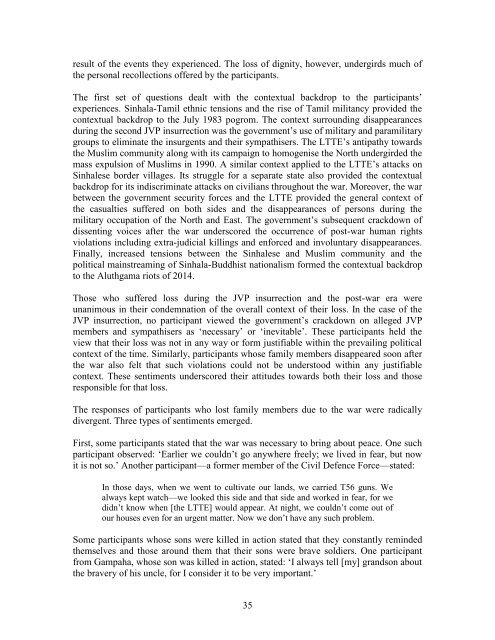Confronting the Complexity of Loss
truth memory justice_final- 11st sep 2015
truth memory justice_final- 11st sep 2015
- No tags were found...
You also want an ePaper? Increase the reach of your titles
YUMPU automatically turns print PDFs into web optimized ePapers that Google loves.
esult <strong>of</strong> <strong>the</strong> events <strong>the</strong>y experienced. The loss <strong>of</strong> dignity, however, undergirds much <strong>of</strong><br />
<strong>the</strong> personal recollections <strong>of</strong>fered by <strong>the</strong> participants.<br />
The first set <strong>of</strong> questions dealt with <strong>the</strong> contextual backdrop to <strong>the</strong> participants’<br />
experiences. Sinhala-Tamil ethnic tensions and <strong>the</strong> rise <strong>of</strong> Tamil militancy provided <strong>the</strong><br />
contextual backdrop to <strong>the</strong> July 1983 pogrom. The context surrounding disappearances<br />
during <strong>the</strong> second JVP insurrection was <strong>the</strong> government’s use <strong>of</strong> military and paramilitary<br />
groups to eliminate <strong>the</strong> insurgents and <strong>the</strong>ir sympathisers. The LTTE’s antipathy towards<br />
<strong>the</strong> Muslim community along with its campaign to homogenise <strong>the</strong> North undergirded <strong>the</strong><br />
mass expulsion <strong>of</strong> Muslims in 1990. A similar context applied to <strong>the</strong> LTTE’s attacks on<br />
Sinhalese border villages. Its struggle for a separate state also provided <strong>the</strong> contextual<br />
backdrop for its indiscriminate attacks on civilians throughout <strong>the</strong> war. Moreover, <strong>the</strong> war<br />
between <strong>the</strong> government security forces and <strong>the</strong> LTTE provided <strong>the</strong> general context <strong>of</strong><br />
<strong>the</strong> casualties suffered on both sides and <strong>the</strong> disappearances <strong>of</strong> persons during <strong>the</strong><br />
military occupation <strong>of</strong> <strong>the</strong> North and East. The government’s subsequent crackdown <strong>of</strong><br />
dissenting voices after <strong>the</strong> war underscored <strong>the</strong> occurrence <strong>of</strong> post-war human rights<br />
violations including extra-judicial killings and enforced and involuntary disappearances.<br />
Finally, increased tensions between <strong>the</strong> Sinhalese and Muslim community and <strong>the</strong><br />
political mainstreaming <strong>of</strong> Sinhala-Buddhist nationalism formed <strong>the</strong> contextual backdrop<br />
to <strong>the</strong> Aluthgama riots <strong>of</strong> 2014.<br />
Those who suffered loss during <strong>the</strong> JVP insurrection and <strong>the</strong> post-war era were<br />
unanimous in <strong>the</strong>ir condemnation <strong>of</strong> <strong>the</strong> overall context <strong>of</strong> <strong>the</strong>ir loss. In <strong>the</strong> case <strong>of</strong> <strong>the</strong><br />
JVP insurrection, no participant viewed <strong>the</strong> government’s crackdown on alleged JVP<br />
members and sympathisers as ‘necessary’ or ‘inevitable’. These participants held <strong>the</strong><br />
view that <strong>the</strong>ir loss was not in any way or form justifiable within <strong>the</strong> prevailing political<br />
context <strong>of</strong> <strong>the</strong> time. Similarly, participants whose family members disappeared soon after<br />
<strong>the</strong> war also felt that such violations could not be understood within any justifiable<br />
context. These sentiments underscored <strong>the</strong>ir attitudes towards both <strong>the</strong>ir loss and those<br />
responsible for that loss.<br />
The responses <strong>of</strong> participants who lost family members due to <strong>the</strong> war were radically<br />
divergent. Three types <strong>of</strong> sentiments emerged.<br />
First, some participants stated that <strong>the</strong> war was necessary to bring about peace. One such<br />
participant observed: ‘Earlier we couldn’t go anywhere freely; we lived in fear, but now<br />
it is not so.’ Ano<strong>the</strong>r participant—a former member <strong>of</strong> <strong>the</strong> Civil Defence Force—stated:<br />
In those days, when we went to cultivate our lands, we carried T56 guns. We<br />
always kept watch—we looked this side and that side and worked in fear, for we<br />
didn’t know when [<strong>the</strong> LTTE] would appear. At night, we couldn’t come out <strong>of</strong><br />
our houses even for an urgent matter. Now we don’t have any such problem.<br />
Some participants whose sons were killed in action stated that <strong>the</strong>y constantly reminded<br />
<strong>the</strong>mselves and those around <strong>the</strong>m that <strong>the</strong>ir sons were brave soldiers. One participant<br />
from Gampaha, whose son was killed in action, stated: ‘I always tell [my] grandson about<br />
<strong>the</strong> bravery <strong>of</strong> his uncle, for I consider it to be very important.’<br />
35



